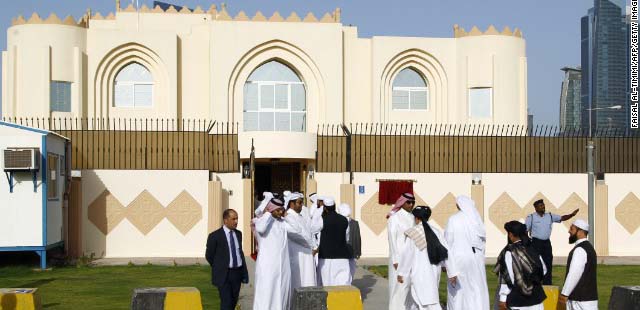The recent news of inauguration of Taliban office in Qatar has changed into a controversial issue. Right after the opening, both Afghan government and political oppositions strongly stood against any move which led to putting away of the government. The opposition was so strong that some even expressed surprise about the level of hatred among Afghans about any possible return of Taliban like government because the procedure was in a manner that gave a notion that Western countries seriously want to make deal with Taliban militants without caring about Afghan government.
It should be noticed that earlier Mr. President was against opening any office for militants, wary of possible setting aside of his government from mainstream. After his serious efforts and arguments, the international community agreed to accept that process should be an Afghan-led one. In spite of such promise and commitment, just early this month, Mr. President pointed the edge of his sharp criticism towards the United States, claiming that it was engaged in clandestine meeting with Taliban militants, the remarks which sparked the strong reaction of the United States.
Kabul pays high importance to talks with militants as foreign security forces are about to withdraw by the fall of 2014. While on the other hand, militants continue resisting on its inflexible policy—no talks with the government which Taliban call as puppet of the United States.
No doubt, and possible peace talks still face numerous hurdles before they begin, including confusion over who would represent the Taliban and Karzai's insistence that his appointees are at the center of negotiations. Clearly, during past years Taliban had never had serious talks with Afghan government or perhaps the United States. Last year when Taliban announced that it called off talks with the United States over what they called to be doubtful policies of the United States. While some news agencies, quoting high profile officials, put the reasons behind the failure of peace talks transfer of Taliban prisoners from Guantanamo prison as part of initial condition for serious peace talks.
The moves of Kabul doomed similar condition. The High Peace Council tried its best to open a single door of negotiation with representatives of Taliban, but finally ended up with suicide bombers. The most obvious example is with assassination of former President, Prof. Rabbani, who was killed by a suicide bomber claimed to be the representative of Taliban.
Meanwhile, Kabul has never become disappointed. President Karzai has left no stone unturned. Taliban defectors were strongly welcomed by him and hold key posts within the current political establishment. No one can dare to open mouth in opposition and ask former Taliban high ranking officials about tens of thousands of people killed during the regime.
After the very collapse of the Taliban regime in 2001, through foreign military intervention, Kabul officials clearly explained for all militants that they could join government without fear of persecution and, more importantly, they would be appointed in key administrative posts. There are a lot of examples about Taliban defectors who are still suspicious of maintaining linkage with former colleagues, but work in quite seductive positions. They are holding mouthwatering posts and no institution dares to question their dark profile.
Let’s put it this way. Taliban militants have had no problem in joining the democratic process. Elements showed interest have been highly welcomed. But one striking turn occurred in late 2009, and that was disappointment of foreign allies for success of military strategies.
Indeed, years of engagement without clear prospective about victory made many foreign allies to reassess their military strategies and search for alternatives. One of those alternatives was of course the so-called Afghanization of the mission, which generally interpreted as transferring responsibilities to Afghan people and giving them authority to take their destiny in their own hands. This process provided Mr. President to stamp on a policy which he maintained and pushed for, perhaps, from the very start of anti-insurgency struggle in 2001.
Thereafter, he has held bold steps to make deal with Taliban militants. He publicly calls them as dissent brothers and even circles around him philosophizes that Taliban have changed dramatically from what they used to be. It is not a very unfamiliar statement in domestic press that if Taliban recapture power and end to current ruling establishment, they would not rule the country as they did. Probably, they allow girls to go to school and observe human rights, specifically, women rights to some extent.
These claims are made with such certainty that leads to false assumption among common civilians. I do not know why such bogus claims are made. Is it due to efforts made by circles within and out of the government in order to draw a more acceptable picture of Taliban militants and the regime they would establish? And I leave the answer for you, but there is one thing that I can assure you about: that is “Talibanism and Human Rights” are contradictory that wouldn’t approach each other at all.
Definitely, officials and civilians alike prefer political settlement. And it is also definite that till Taliban leaders do not reach to calculation that they only waste their strength, fighting Kabul without any hope for its collapse, they would stretch hand for peace. The only thing President Karzai should notice that is only possible through close cooperation with foreign allies and empowerment of his government, particularly security forces.

